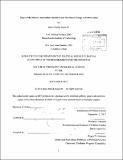States of the nations : nationalism, narratives and normative change in Postwar Japan
Author(s)
Boyd, James Patrick, 1971-
DownloadFull printable version (31.50Mb)
Alternative title
Nationalism, narratives and normative change in Postwar Japan
Other Contributors
Massachusetts Institute of Technology. Dept. of Political Science.
Advisor
Richard J. Samuels.
Terms of use
Metadata
Show full item recordAbstract
This dissertation evaluates claims that nationalism is rising in post-Cold War Japan by first noting the disconnect between existent social science conceptions of nationalism and those needed to examine how nationalism might change in contemporary, peaceful, wealthy, and stable democracies such as postwar Japan. This study defines nationalism as a discourse that constructs and reconstructs points of identification and differentiation that define both a political community (i.e. "nation") and the form of its domain over a modern territorial state. It argues nationalism is best understood as reoccurring "nation-state narratives" that tell the story of how the nation's putative qualities or past experiences define the present nature of its territorial state. Change in nationalism is evaluated through content and discourse analysis of five narratives expressing the relationship between the Japanese people and their state in a sample of elite discourse drawn from the period 1952-2007. The analysis reveals that references to all five narratives peak in the immediate postwar period and again in the 1980s before declining to lows in the post-Cold War period, which also saw the highest level of contestation over these narratives in the nearly sixty years of the study. In particular, the narrative depicting Japan as an anti-militarist/pacifist nation-state as well as the narrative emphasizing Japan as an ethnically homogeneous nation-state proved the most contested during this period, while the narrative affirming Japan as a democratic nation-state went uncontested. Political struggles over reforming institutions associated with the narratives were found to be the major drivers behind these changes, although characteristics of the narratives, especially the specificity of their normative claims, also shaped this process. The post-Cold War period is thus one of transition in nationalist discourse in Japan, although the scale of change is somewhat limited. For example, while the anti-militarist/pacifist narrative saw exceptions attached to many of its normative claims, its anti-nuclear components and cognitive claims remained unchallenged. Finally, Japanese nationalist discourse continued to legitimate democracy and was found to shape important electoral reforms, even as it shifted away from more insular and exclusionary forms, which may create space for more open immigration policies moving forward.
Description
Thesis (Ph. D.)--Massachusetts Institute of Technology, Dept. of Political Science, 2012. Cataloged from PDF version of thesis. Includes bibliographical references (p. 447-467).
Date issued
2012Department
Massachusetts Institute of Technology. Department of Political SciencePublisher
Massachusetts Institute of Technology
Keywords
Political Science.